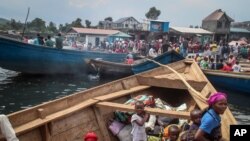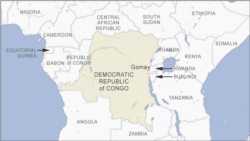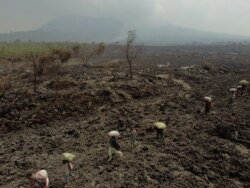DR Congo's government mistakenly announced Saturday that another volcano had erupted, later admitting it was a false alarm, with the scare coming a week after Mount Nyiragongo roared back into life, causing devastation and sparking a mass exodus.
The blunder comes as the government is increasingly being criticized for a looming humanitarian crisis, with about 400,000 residents having evacuated the eastern city of Goma after a week of rolling aftershocks.
More suffering briefly seemed imminent when the government said that Murara volcano, considered to be a crater of Mount Nyamuragira just 25 kilometers (15 miles) north of Goma, had erupted Saturday morning.
The communications ministry said the "low intensity" eruption sent lava flowing into an uninhabited area, before issuing another statement saying it was a "false alarm on Nyamuragira."
"A plane has just flown over the entire area on the sides of this volcano. No eruption was observed," it added.
"It was instead intense activities of carbonizing wood into charcoal, the smoke of which was perceived as volcanic activity."
The Goma Volcano Observatory (OVG) confirmed that while there was "intense activity" at Nyamuragira, "there has been no eruption".
'Limnic eruption' fears
Goma, the capital of North Kivu province, lies on the shores of Lake Kivu in the shadow of Nyiragongo, Africa's most active volcano.
Last Saturday, the strato-volcano spewed rivers of lava that claimed nearly three dozen lives and destroyed the homes of 20,000 people before the eruption stopped.
Hundreds of aftershocks have rocked the region since, but the OVG said Saturday they had significantly decreased in both number and intensity over the past 48 hours.
The OVG's latest report said that 61 earthquakes had shaken the area in the previous 24 hours.
It said the quakes were "consistent with the continued movement of magma in the Nyiragongo fissure system toward Lake Kivu."
Scientists have warned of a potentially catastrophic scenario -- a "limnic eruption," which occurs when lava combines with a deep lake and spews out lethal gas across a potentially large area.
However, the OVG report said a "landslide or large earthquake destabilizing the deep waters of the lake causing the emergence of dissolved gases" was now much less likely, though it still "cannot be excluded".
The OVG did list three likely scenarios for the coming days, in two of which the magma stays underground -- whether the tremors continue or not. In the third, the earthquakes cause the lava to come to the surface, possibly in fissures that fracture the streets of Goma.
About 80,000 households -- 400,000 inhabitants -- have moved out of the city since Thursday, when a "preventative" evacuation order was given.
Goma was quiet Saturday, with a handful of vehicles on the semi-deserted streets and only some small shops open, an AFP journalist said.
'I have nothing left'
Around 3,000 people fleeing Goma sought refuge at a temporary camp in Rugerero, about 10 kilometers (six miles) over the Rwandan border.
But Saturday, an estimated 1,200 had left to return to Goma, a Rwanda government official at Rugerero told AFP on condition of anonymity. Military trucks were seen transporting refugees to the border.
William Byukusenge, a construction worker, told AFP that "if it erupts again, we will come back to Rwanda".
But another evacuee, Marie Claire Uwineza, said she had nowhere left to go.
"My house was burned, and I have nothing left," said the 39-year-old, who fled with two of her children.
Congolese President Felix Tshisekedi held a cabinet meeting Friday in which he called on the government to "redouble its efforts to better deal with the humanitarian situation".
Criticism has been growing over the government response after Thursday's evacuation order was met with fear and traffic jams, many not knowing where to go.
"The population had the impression of being abandoned to their sad fate," said the newspaper EcoNews, calling it "a perfect illustration of the fact that the state does not exist".
"The state has decided to evacuate the population of Goma and Nyiragongo without giving any help," citizen movement Lucha tweeted.
Prime Minister Jean-Michel Sama Lukonde defended the government's response, saying the event had "no similarity to previous eruptions in that it occurred without warning signs".
The mounting humanitarian crisis comes in a region that has been ravaged by violence for three decades. Access to drinkable water is particularly urgent, according to aid organizations in the area.
"Sometimes it's the war, now it's the volcano," a customs officers grumbled Saturday.


